![]()
ABOUT the musicians of the Arab Classical Music Society
|
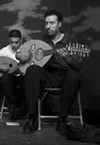 Majed Abu Ajamia, 'ud Majed Abu Ajamia, 'udMajed studied ud in Jerusalem with master William Hagopian. He moved to the United States in 1990 and has been musically active since then. His experience extends from the performance of traditional repertoire of the Middle East, to research of Arab influences on various Western musical styles. As a bandleader, Majed has produced many concerts and Middle Eastern educational programs. His musicality and research skills made him one of the most promising young Palestinian musicians of his generation. |
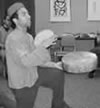 Najib Bahri, Arabic percussion Najib Bahri, Arabic percussionNajib Bahri, Tunisian, grew up in a family of musicians with whom he started playing Arabic percussion instruments at the age of eight. The family performed in theatres and for the Tunisian television. At age sixteen, he attended the Tunisian National Conservatory of Music. Najib moved to France to finish his education and performed in Parisian nightclubs. He developed a holistic teaching style that incorporates breathing, singing, and body movement as part of the oral-tradition methods transmitted to him by the masters of Tunisian music. Since then, he has been an active performer and researcher of different world rhythms. Throughout his career, Najib accompanied some of the most prestigious musicians of the Arabic world. Inventor of the electric darbouka, Najib builds specialized Arabic percussion instruments and is the leader of the musical group al-Amal, The Hope. |
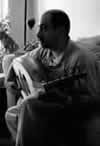 Issa Boulos, 'ud Issa Boulos, 'ud Palestinian 'ud player, composer, lyricist Issa Boulos moved to Chicago nearly a decade ago to study music composition at Columbia College and at Roosevelt University. Since then he's become a major local proponent of Arab music and composer who is known for exploring various musical styles from diverse musical traditions. His compositions include works for plays, orchestras, and ensembles featuring world class performers. He is involved with several different projects: his quartet's original music straddles Arabic music and jazz, the al-Sharq Ensemble focuses on a traditional Arabic folk and art music, and the University of Chicago Middle East Ensemble (which he directs) plays classical and folkloric music from the Middle East, Turkey, and the Balkans. Issa is also featured as performer in many recordings including The Jazz Ensemble of Brad Williams and various other groups. This year he founded the Arab Classical Musical Society, a networking group for musicians and continues to give lectures and research various ethnomusiclogical topic related to Middle Eastern music. His teaching credits include Columbia College, University of Chicago, the Palestine National Conservatory, Old Town School of Folk Music. Issa is an Artist-in-Residence for the Gallery 37 Center for the Arts in Chicago. |
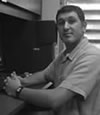 Nihad Dukhan, Arabic
Caligraphy, 'ud, riqq Nihad Dukhan, Arabic
Caligraphy, 'ud, riqqNihad Dukhan was born in Nuseirat Camp, Gaza, Palestine in 1964. He attended local schools before enrolling at Al-Najah National University in Nablus, West Bank, where he studied Physics. He arrived in Toledo, Ohio in August 1983 where he started his studies at the University of Toledo's College of Engineering. He received his Ph.D. in 1996 in Mechanical Engineering. Dr. Dukhan was then appointed as a lecturer in the area of Thermo/Fluid Sciences at the University of Toledo. He then worked as a Senior Engineer at Marconi Communications in the Chicago area. Currently he is a visiting professor of Mechanical Engineering at the University of Puerto Rico- Mayaguez. He regards himself as a reader and a listener: he has a compelling interest in Arabic and English literature (especially poetry), classical Arabic music and Jazz. Dr. Dukhan's fascination with the Arabic language, written and spoken, started when he was in grade school. His interest in Arabic calligraphy began when he started learning the Riq'a script from his Arabic language teacher in the sixth grade. He then competed with neighborhood children in writing words on the nicely finished outside walls of the neighbors' houses. He continuously trained himself, and still does, in all the classical styles of Arabic calligraphy by imitating the works of many master calligraphers. |
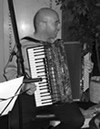 Walid Hajali, accordion, double
bass Walid Hajali, accordion, double
bass Walid obtained his BA in music from Damascus Conservatory, in Syria 1996, with focus on contrabass. He served as a member of the Damascus Philharmonic Orchestra from 1991 to1996. As a member of many Middle Eastern orchestras (on Accordion), Walid played in numerous festivals around the Middle East. Examples include the Jerash Festival, Jordan (1989), Qirtaj Festival, Tunisia (1991), and Anjar Festival, Lebanon. He worked as a music educator and taught Arabic and Western Music theories in several Damascus institutes. In 1996, he joined the Masters of Music with focus on contrabass and orchestration at the Munster conservatory in Detmold, Germany. He performed with the Munster Philharmonic Orchestra in France, Holland and Belgium. Walid served as a director of the Middle Eastern Ensemble at the University of Chicago from 2001 to 2003. |
 Maged Mikhail, nay,
percussion Maged Mikhail, nay,
percussionMaged is a nay player, a drummer, a technologist, and a student of Egyptian culture and languages. His interest in music started in his home town of Alexandria, Egypt where he grew up listening to chants of the Coptic Church. His desire to learn all about his heritage led him to the study of Ancient Egyptian history and languages. When he came to the United States to complete his Master's Degree in computer science, the topic of his thesis was Applications of Computer Science on Egyptology. As a drummer and nay player he teamed up with other performers in Chicago through the Taqaseem Ensemble. He also combined his interest in technology and Arabic music by creating one of the most popular nay page on the web, as well as many resources of Arabic musicians. He has been promoting and sharing knowledge about the nay for many years now. During his studies with University with Chicago, he created a program to display, transpose, and play back maqams. He is also working on a tuner specifically created for Arab music. Maged will be working with ACMS to expand the sheet music and audio library capabilities with a searchable database and plan the first Midwest Summer Arab Music Retreat. |
|
Naeif is an active performer here in Chicago and is considered one of the most promising Nay players in the Middle East.The Syrian Symphony toured the US, and performed to an enthusiastic Los Angeles audience with their American debut in 1998. At this time, Naeif decided to relocate to the US - arriving in Chicago on the 4th of July in 1999. Today, Naeif maintains a busy schedule, performing in Chicago's lively Arabic nightclub scene, and playing Arabic classical music in the al Sham Ensemble, in the City of Chicago's "Miles of Music", Issa Boulos' al Sharq Ensemble and Walid al Hajali's Middle Eastern Ensemble at the University of Chicago among many others |
 Martin Stokes (D.Phil Oxford 1989), qanun,
'ud Martin Stokes (D.Phil Oxford 1989), qanun,
'udMartin studies music with a particular emphasis on the contemporary Middle East, circum-Mediterranean, and NW Europe. His recent work has explored issues of space, place, movement, nationalism, globalization, ethnicity, race and identity, sentiment, emotion and violence. Publications include: The Arabesk Debate: Music and Musicians in Modern Turkey, 1992; (ed.) Ethnicity, Identity and Music: The Musical Construction of Place, 1992/7; (co-ed) Nationalism, Minorities and Diasporas: Identities and Rights in the Middle East, 1996, (co-ed) Special Middle-East Issue of Popular Music, 1996; Voices and Places: History, Repetition and the Musical Imagination, Journal of the Royal Anthroplogical Society 3 no. 4, (1997)673-691; Alaturka Fantasies: Deceit, the Voice and the Arabesk Stage, New Formations 27, (1995-6) 42-58; Where was Mirkelam Running?, Mediterraneans (1997-8) 326-331; forthcoming: Beloved Istanbul: Realism and the Transnational Imaginary in Turkish Popular Culture for a University of California Press volume on Mass Media in the Middle East; Writing Arabesk: Representation and Cultural Legitimacy in Modern Turkey for a University of California Press volume on 'Western Music and its Others'; Essays on Race, Identity and Ethnicity for Cassell Encyclopaedia of Popular Music; articles on Turkey and other subjects for New Grove Dictionary of Music and Musicians and Garland Encyclopaedia of Ethnomusicology; '"Silver Sounds in the Citadel?": Islam and Musicology' for Routledge volume on Islam and Disciplinarity. Stokes is also co-editor of Europe Inside-Out: Ethnomusicology and Modernities (co- editor of first volume, Celticism) and co-editor of online journal Music and Anthropology. He is on the editorial boards of Popular Music, Folk Music Journal, World Music Reports, and Chicago Studies in Ethnomusicology; at the University of Chicago since 1997. |
Since 1965 Jim has performed regularly at major functions within these ethnic communities and has appeared with various groups throughout the U.S. and Greece. In addition to recordings and TV/Radio productions, he also gives lecture/performances and authors articles on the Balkan clarinet for various publications. He has served as the curator and coordinator for Chicagoâs Hellenic Museum & Cultural Center exhibit of Greek Music, instruments and discography, and will be building itâs archive and permanent exhibit upon completion of the museumâs new facilities (est. 2005). While Jim also remains active in various entrepreneurial and business consulting endeavors, he continues to perform regularly and is preparing a comprehensive recording which will contrast regional Greek, Macedonian, Epirus and Turkish clarinet styles. |
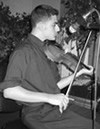 Wanees Zarour,
violin, buzuq, Arabic percussion Wanees Zarour,
violin, buzuq, Arabic percussionWanees is a promising young Palestinian musican who plays various instruments With enthusiastic musicianship has been evolving brilliantly despite his young age. Wanees's multi-talent in performance and composition has granted him scholarships helped him getting featured with top musicians from all over the Arabic World. |
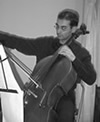
 Omar Musfi
Omar Musfi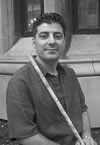 Naeif Rafeh
Naeif Rafeh Jim Stoynoff, clarinet
Jim Stoynoff, clarinet